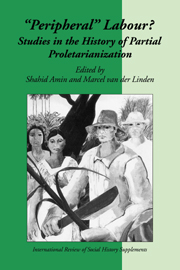Book contents
- Frontmatter
- Contents
- Introduction
- Colonialism, Capitalism and the Discourse of Freedom
- The Barriers to Proletarianization: Bolivian Mine Labour, 1826–1918
- Labour, Ecology and History in a Puerto Rican Plantation Region: “Classic” Rural Proletarians Revisited
- Coal and Colonialism: Production Relations in an Indian Coalfield, c. 1895–1947
- “Capital Spectacles in British Frames”: Capital, Empire and Indian Indentured Migration to the British Caribbean
- Unsettling the Household: Act VI (of 1901) and the Regulation of Women Migrants in Colonial Bengal
- Sordid Class, Dangerous Class? Observations on Parisian Ragpickers and their Cités During the Nineteenth Century
- Notes on Contributors
The Barriers to Proletarianization: Bolivian Mine Labour, 1826–1918
Published online by Cambridge University Press: 14 October 2009
- Frontmatter
- Contents
- Introduction
- Colonialism, Capitalism and the Discourse of Freedom
- The Barriers to Proletarianization: Bolivian Mine Labour, 1826–1918
- Labour, Ecology and History in a Puerto Rican Plantation Region: “Classic” Rural Proletarians Revisited
- Coal and Colonialism: Production Relations in an Indian Coalfield, c. 1895–1947
- “Capital Spectacles in British Frames”: Capital, Empire and Indian Indentured Migration to the British Caribbean
- Unsettling the Household: Act VI (of 1901) and the Regulation of Women Migrants in Colonial Bengal
- Sordid Class, Dangerous Class? Observations on Parisian Ragpickers and their Cités During the Nineteenth Century
- Notes on Contributors
Summary
Labour history in Latin America has, to a great degree, followed the models set by the rich historiography in Europe and North America. Other than a justifiable concern with the peculiarities in production for export of primary goods, much of the Latin American historiography suggests that the process of labour formation was rather similar to that of the North Atlantic economies, only lagging behind, as did industrialization in this region of the world. However, this was not the case. The export orientation of the mining industry and its peripheral location in the world economy introduced certain modifications not found in the North Atlantic economies. The vagaries of the mining industry, exacerbated by the severe swings in raw material prices, created conditions which hindered proletarianization and modified the consciousness of the mine workers.
Mining was in some ways an exceptional activity, but it shows in sharp relief the peculiarities of Latin American economic development and subsequent differences in the process of labour formation. In mining, labour specialization was especially marked and also levels of capitalization were much higher than in agriculture or virtually any other export activity. After all, mining production involved, even in the nineteenth century, a mix of skilled and unskilled labour, extensive supervision, the use of a considerable amount of machinery and production schedules that mimicked industrial processes.
Unfortunately, relatively little scholarly work has been done on the history of Andean mine labour from the nineteenth century until the recent past.
- Type
- Chapter
- Information
- Peripheral LabourStudies in the History of Partial Proletarianization, pp. 27 - 52Publisher: Cambridge University PressPrint publication year: 1997



